Ethical and Policy Analysis of Organ Conscription in Healthcare
VerifiedAdded on 2022/11/07
|6
|1226
|424
Essay
AI Summary
This essay delves into the ethical considerations surrounding organ conscription policies, particularly focusing on cadaveric organ donation. It addresses concerns about retrieving organs from the deceased without consent, highlighting ethical principles like respect for the deceased and their families. The paper explores the fairness and justness of organ conscription, arguing that the cadaveric policy can save lives by increasing organ availability and reducing the shortage in hospitals. It emphasizes the critical role of consent from donors or their families, aligning with healthcare ethics and cultural practices. The Munson policy is presented as a beneficial approach, advocating for organ retrieval from the recently deceased to ensure a continuous supply of organs, ultimately saving lives. References supporting these arguments are also provided.
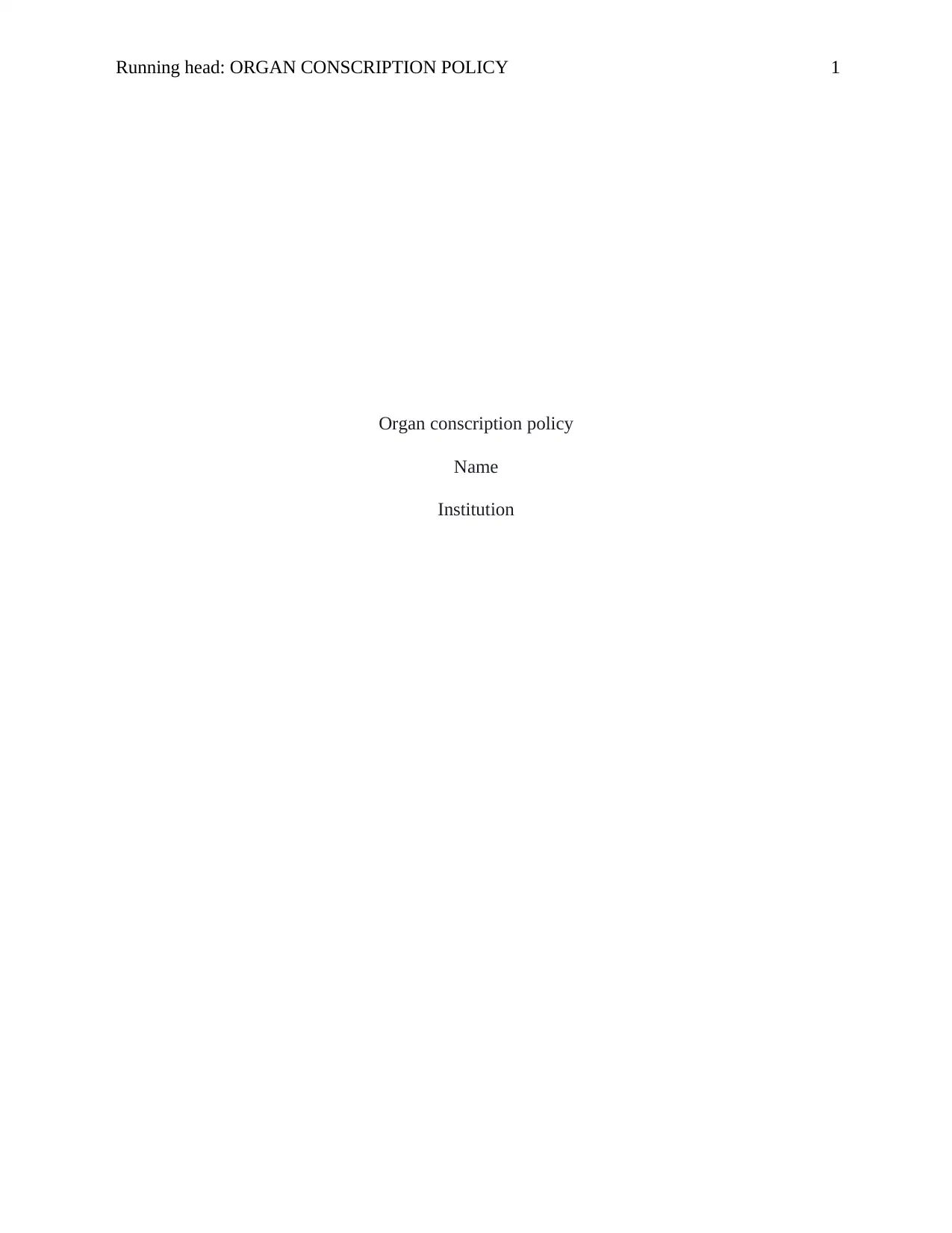
Running head: ORGAN CONSCRIPTION POLICY 1
Organ conscription policy
Name
Institution
Organ conscription policy
Name
Institution
Paraphrase This Document
Need a fresh take? Get an instant paraphrase of this document with our AI Paraphraser
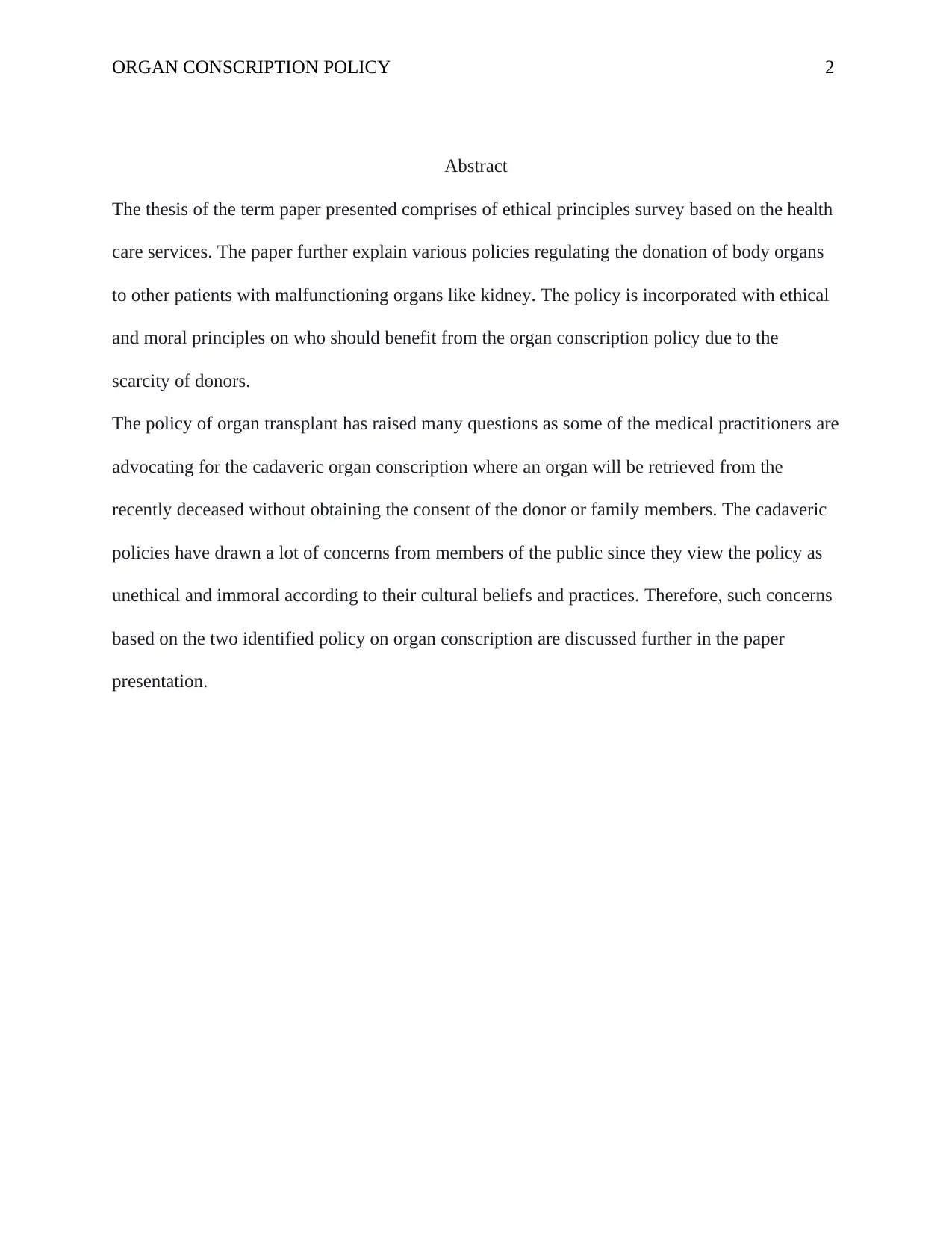
ORGAN CONSCRIPTION POLICY 2
Abstract
The thesis of the term paper presented comprises of ethical principles survey based on the health
care services. The paper further explain various policies regulating the donation of body organs
to other patients with malfunctioning organs like kidney. The policy is incorporated with ethical
and moral principles on who should benefit from the organ conscription policy due to the
scarcity of donors.
The policy of organ transplant has raised many questions as some of the medical practitioners are
advocating for the cadaveric organ conscription where an organ will be retrieved from the
recently deceased without obtaining the consent of the donor or family members. The cadaveric
policies have drawn a lot of concerns from members of the public since they view the policy as
unethical and immoral according to their cultural beliefs and practices. Therefore, such concerns
based on the two identified policy on organ conscription are discussed further in the paper
presentation.
Abstract
The thesis of the term paper presented comprises of ethical principles survey based on the health
care services. The paper further explain various policies regulating the donation of body organs
to other patients with malfunctioning organs like kidney. The policy is incorporated with ethical
and moral principles on who should benefit from the organ conscription policy due to the
scarcity of donors.
The policy of organ transplant has raised many questions as some of the medical practitioners are
advocating for the cadaveric organ conscription where an organ will be retrieved from the
recently deceased without obtaining the consent of the donor or family members. The cadaveric
policies have drawn a lot of concerns from members of the public since they view the policy as
unethical and immoral according to their cultural beliefs and practices. Therefore, such concerns
based on the two identified policy on organ conscription are discussed further in the paper
presentation.
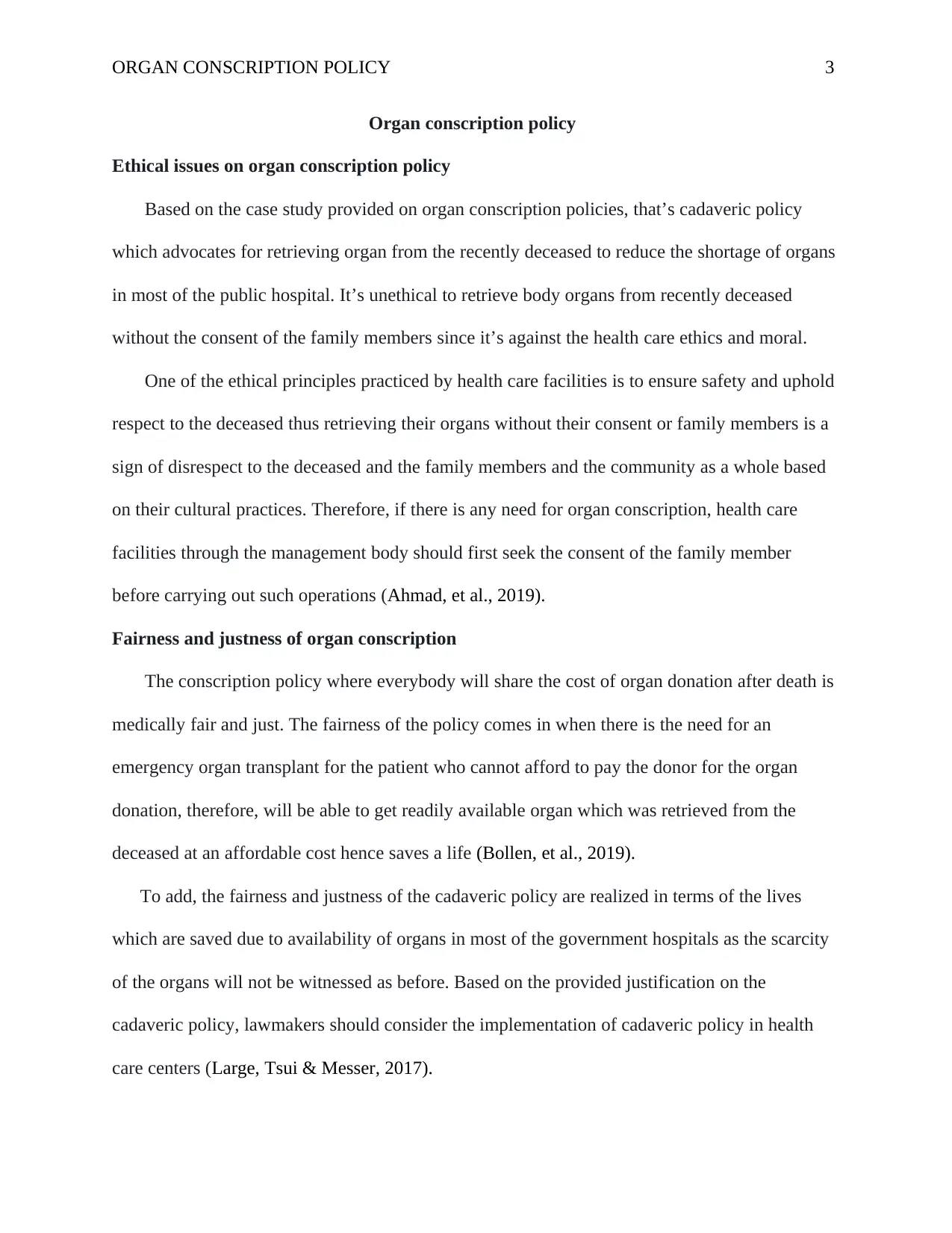
ORGAN CONSCRIPTION POLICY 3
Organ conscription policy
Ethical issues on organ conscription policy
Based on the case study provided on organ conscription policies, that’s cadaveric policy
which advocates for retrieving organ from the recently deceased to reduce the shortage of organs
in most of the public hospital. It’s unethical to retrieve body organs from recently deceased
without the consent of the family members since it’s against the health care ethics and moral.
One of the ethical principles practiced by health care facilities is to ensure safety and uphold
respect to the deceased thus retrieving their organs without their consent or family members is a
sign of disrespect to the deceased and the family members and the community as a whole based
on their cultural practices. Therefore, if there is any need for organ conscription, health care
facilities through the management body should first seek the consent of the family member
before carrying out such operations (Ahmad, et al., 2019).
Fairness and justness of organ conscription
The conscription policy where everybody will share the cost of organ donation after death is
medically fair and just. The fairness of the policy comes in when there is the need for an
emergency organ transplant for the patient who cannot afford to pay the donor for the organ
donation, therefore, will be able to get readily available organ which was retrieved from the
deceased at an affordable cost hence saves a life (Bollen, et al., 2019).
To add, the fairness and justness of the cadaveric policy are realized in terms of the lives
which are saved due to availability of organs in most of the government hospitals as the scarcity
of the organs will not be witnessed as before. Based on the provided justification on the
cadaveric policy, lawmakers should consider the implementation of cadaveric policy in health
care centers (Large, Tsui & Messer, 2017).
Organ conscription policy
Ethical issues on organ conscription policy
Based on the case study provided on organ conscription policies, that’s cadaveric policy
which advocates for retrieving organ from the recently deceased to reduce the shortage of organs
in most of the public hospital. It’s unethical to retrieve body organs from recently deceased
without the consent of the family members since it’s against the health care ethics and moral.
One of the ethical principles practiced by health care facilities is to ensure safety and uphold
respect to the deceased thus retrieving their organs without their consent or family members is a
sign of disrespect to the deceased and the family members and the community as a whole based
on their cultural practices. Therefore, if there is any need for organ conscription, health care
facilities through the management body should first seek the consent of the family member
before carrying out such operations (Ahmad, et al., 2019).
Fairness and justness of organ conscription
The conscription policy where everybody will share the cost of organ donation after death is
medically fair and just. The fairness of the policy comes in when there is the need for an
emergency organ transplant for the patient who cannot afford to pay the donor for the organ
donation, therefore, will be able to get readily available organ which was retrieved from the
deceased at an affordable cost hence saves a life (Bollen, et al., 2019).
To add, the fairness and justness of the cadaveric policy are realized in terms of the lives
which are saved due to availability of organs in most of the government hospitals as the scarcity
of the organs will not be witnessed as before. Based on the provided justification on the
cadaveric policy, lawmakers should consider the implementation of cadaveric policy in health
care centers (Large, Tsui & Messer, 2017).
⊘ This is a preview!⊘
Do you want full access?
Subscribe today to unlock all pages.

Trusted by 1+ million students worldwide
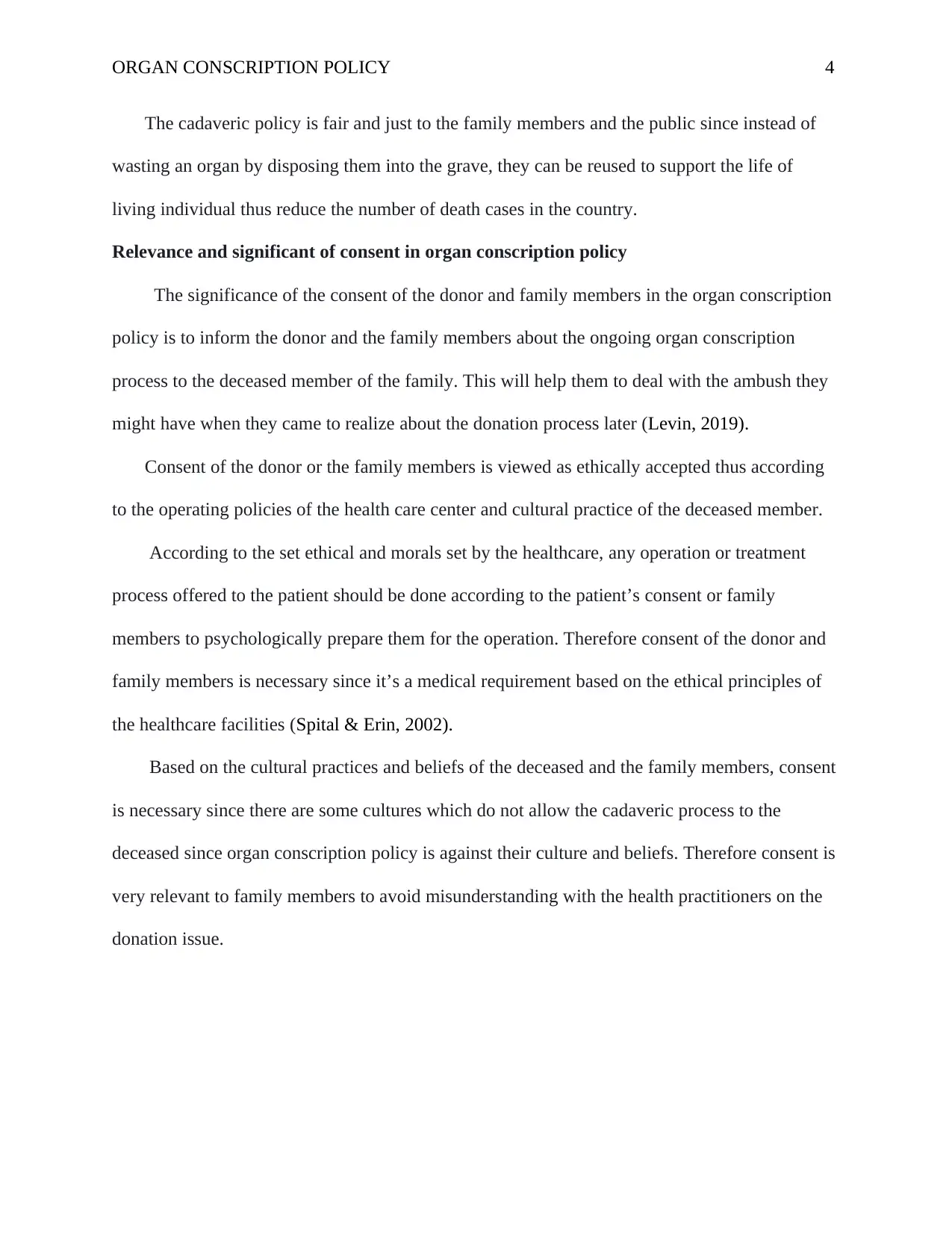
ORGAN CONSCRIPTION POLICY 4
The cadaveric policy is fair and just to the family members and the public since instead of
wasting an organ by disposing them into the grave, they can be reused to support the life of
living individual thus reduce the number of death cases in the country.
Relevance and significant of consent in organ conscription policy
The significance of the consent of the donor and family members in the organ conscription
policy is to inform the donor and the family members about the ongoing organ conscription
process to the deceased member of the family. This will help them to deal with the ambush they
might have when they came to realize about the donation process later (Levin, 2019).
Consent of the donor or the family members is viewed as ethically accepted thus according
to the operating policies of the health care center and cultural practice of the deceased member.
According to the set ethical and morals set by the healthcare, any operation or treatment
process offered to the patient should be done according to the patient’s consent or family
members to psychologically prepare them for the operation. Therefore consent of the donor and
family members is necessary since it’s a medical requirement based on the ethical principles of
the healthcare facilities (Spital & Erin, 2002).
Based on the cultural practices and beliefs of the deceased and the family members, consent
is necessary since there are some cultures which do not allow the cadaveric process to the
deceased since organ conscription policy is against their culture and beliefs. Therefore consent is
very relevant to family members to avoid misunderstanding with the health practitioners on the
donation issue.
The cadaveric policy is fair and just to the family members and the public since instead of
wasting an organ by disposing them into the grave, they can be reused to support the life of
living individual thus reduce the number of death cases in the country.
Relevance and significant of consent in organ conscription policy
The significance of the consent of the donor and family members in the organ conscription
policy is to inform the donor and the family members about the ongoing organ conscription
process to the deceased member of the family. This will help them to deal with the ambush they
might have when they came to realize about the donation process later (Levin, 2019).
Consent of the donor or the family members is viewed as ethically accepted thus according
to the operating policies of the health care center and cultural practice of the deceased member.
According to the set ethical and morals set by the healthcare, any operation or treatment
process offered to the patient should be done according to the patient’s consent or family
members to psychologically prepare them for the operation. Therefore consent of the donor and
family members is necessary since it’s a medical requirement based on the ethical principles of
the healthcare facilities (Spital & Erin, 2002).
Based on the cultural practices and beliefs of the deceased and the family members, consent
is necessary since there are some cultures which do not allow the cadaveric process to the
deceased since organ conscription policy is against their culture and beliefs. Therefore consent is
very relevant to family members to avoid misunderstanding with the health practitioners on the
donation issue.
Paraphrase This Document
Need a fresh take? Get an instant paraphrase of this document with our AI Paraphraser
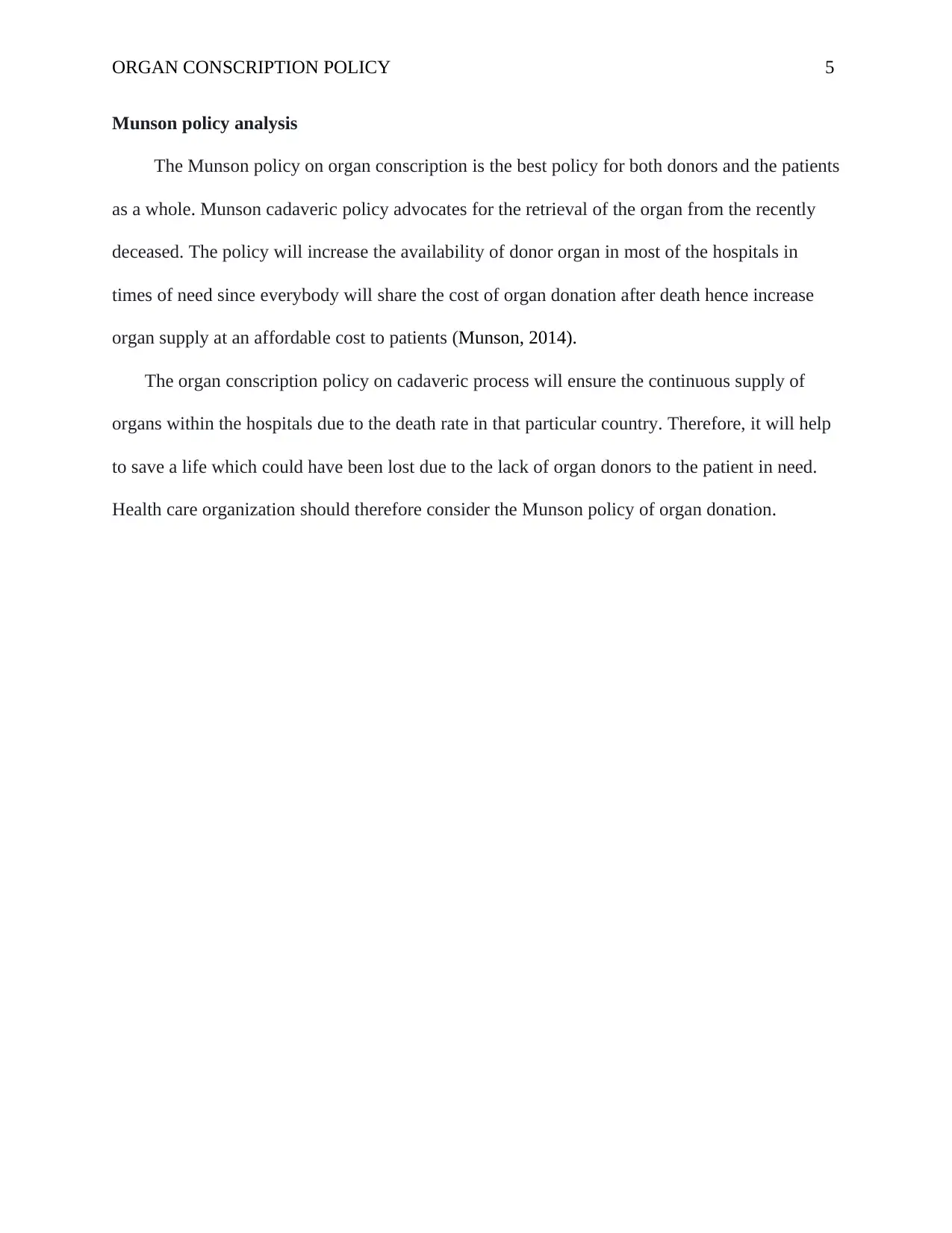
ORGAN CONSCRIPTION POLICY 5
Munson policy analysis
The Munson policy on organ conscription is the best policy for both donors and the patients
as a whole. Munson cadaveric policy advocates for the retrieval of the organ from the recently
deceased. The policy will increase the availability of donor organ in most of the hospitals in
times of need since everybody will share the cost of organ donation after death hence increase
organ supply at an affordable cost to patients (Munson, 2014).
The organ conscription policy on cadaveric process will ensure the continuous supply of
organs within the hospitals due to the death rate in that particular country. Therefore, it will help
to save a life which could have been lost due to the lack of organ donors to the patient in need.
Health care organization should therefore consider the Munson policy of organ donation.
Munson policy analysis
The Munson policy on organ conscription is the best policy for both donors and the patients
as a whole. Munson cadaveric policy advocates for the retrieval of the organ from the recently
deceased. The policy will increase the availability of donor organ in most of the hospitals in
times of need since everybody will share the cost of organ donation after death hence increase
organ supply at an affordable cost to patients (Munson, 2014).
The organ conscription policy on cadaveric process will ensure the continuous supply of
organs within the hospitals due to the death rate in that particular country. Therefore, it will help
to save a life which could have been lost due to the lack of organ donors to the patient in need.
Health care organization should therefore consider the Munson policy of organ donation.
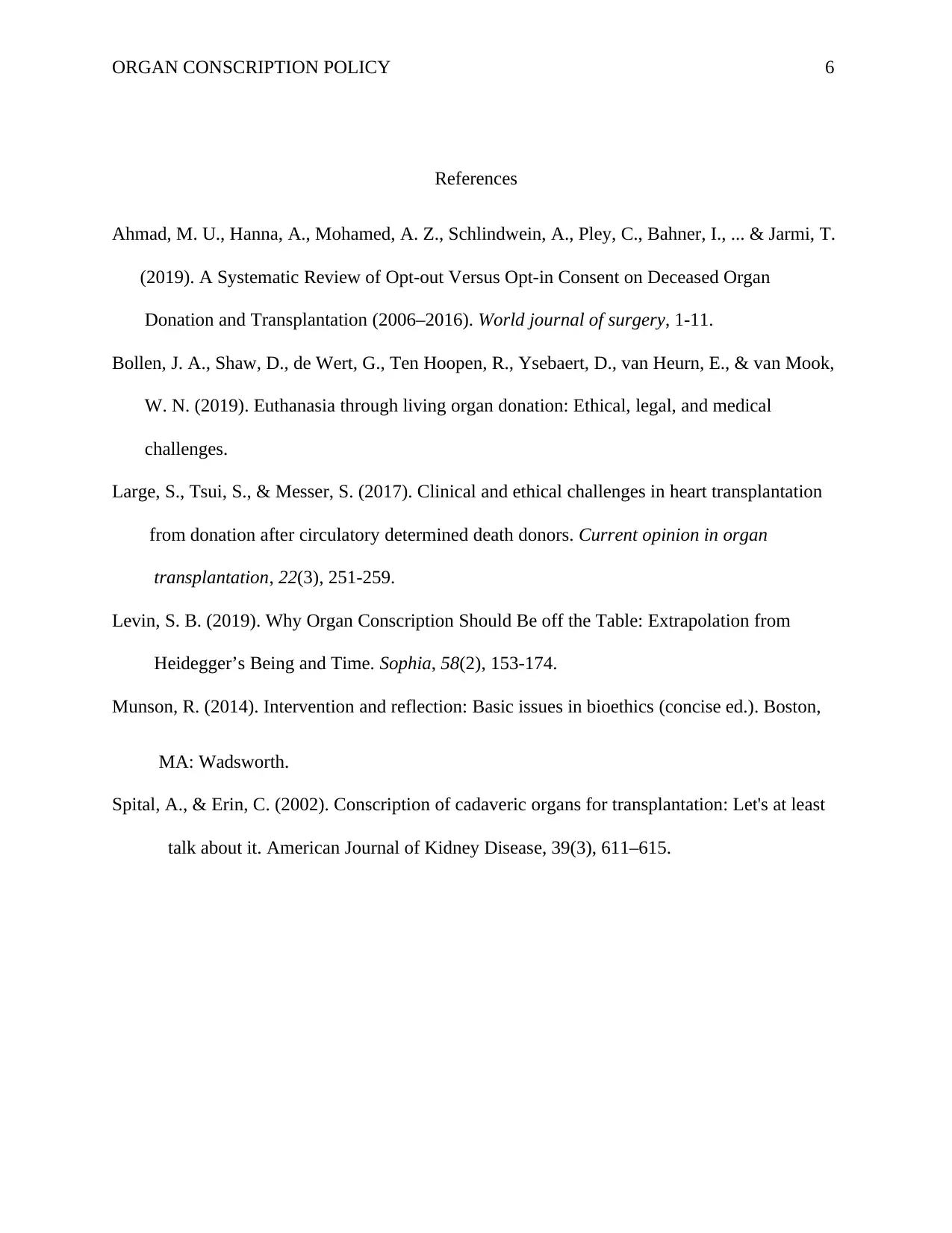
ORGAN CONSCRIPTION POLICY 6
References
Ahmad, M. U., Hanna, A., Mohamed, A. Z., Schlindwein, A., Pley, C., Bahner, I., ... & Jarmi, T.
(2019). A Systematic Review of Opt-out Versus Opt-in Consent on Deceased Organ
Donation and Transplantation (2006–2016). World journal of surgery, 1-11.
Bollen, J. A., Shaw, D., de Wert, G., Ten Hoopen, R., Ysebaert, D., van Heurn, E., & van Mook,
W. N. (2019). Euthanasia through living organ donation: Ethical, legal, and medical
challenges.
Large, S., Tsui, S., & Messer, S. (2017). Clinical and ethical challenges in heart transplantation
from donation after circulatory determined death donors. Current opinion in organ
transplantation, 22(3), 251-259.
Levin, S. B. (2019). Why Organ Conscription Should Be off the Table: Extrapolation from
Heidegger’s Being and Time. Sophia, 58(2), 153-174.
Munson, R. (2014). Intervention and reflection: Basic issues in bioethics (concise ed.). Boston,
MA: Wadsworth.
Spital, A., & Erin, C. (2002). Conscription of cadaveric organs for transplantation: Let's at least
talk about it. American Journal of Kidney Disease, 39(3), 611–615.
References
Ahmad, M. U., Hanna, A., Mohamed, A. Z., Schlindwein, A., Pley, C., Bahner, I., ... & Jarmi, T.
(2019). A Systematic Review of Opt-out Versus Opt-in Consent on Deceased Organ
Donation and Transplantation (2006–2016). World journal of surgery, 1-11.
Bollen, J. A., Shaw, D., de Wert, G., Ten Hoopen, R., Ysebaert, D., van Heurn, E., & van Mook,
W. N. (2019). Euthanasia through living organ donation: Ethical, legal, and medical
challenges.
Large, S., Tsui, S., & Messer, S. (2017). Clinical and ethical challenges in heart transplantation
from donation after circulatory determined death donors. Current opinion in organ
transplantation, 22(3), 251-259.
Levin, S. B. (2019). Why Organ Conscription Should Be off the Table: Extrapolation from
Heidegger’s Being and Time. Sophia, 58(2), 153-174.
Munson, R. (2014). Intervention and reflection: Basic issues in bioethics (concise ed.). Boston,
MA: Wadsworth.
Spital, A., & Erin, C. (2002). Conscription of cadaveric organs for transplantation: Let's at least
talk about it. American Journal of Kidney Disease, 39(3), 611–615.
⊘ This is a preview!⊘
Do you want full access?
Subscribe today to unlock all pages.

Trusted by 1+ million students worldwide
1 out of 6
Related Documents
Your All-in-One AI-Powered Toolkit for Academic Success.
+13062052269
info@desklib.com
Available 24*7 on WhatsApp / Email
![[object Object]](/_next/static/media/star-bottom.7253800d.svg)
Unlock your academic potential
Copyright © 2020–2025 A2Z Services. All Rights Reserved. Developed and managed by ZUCOL.





